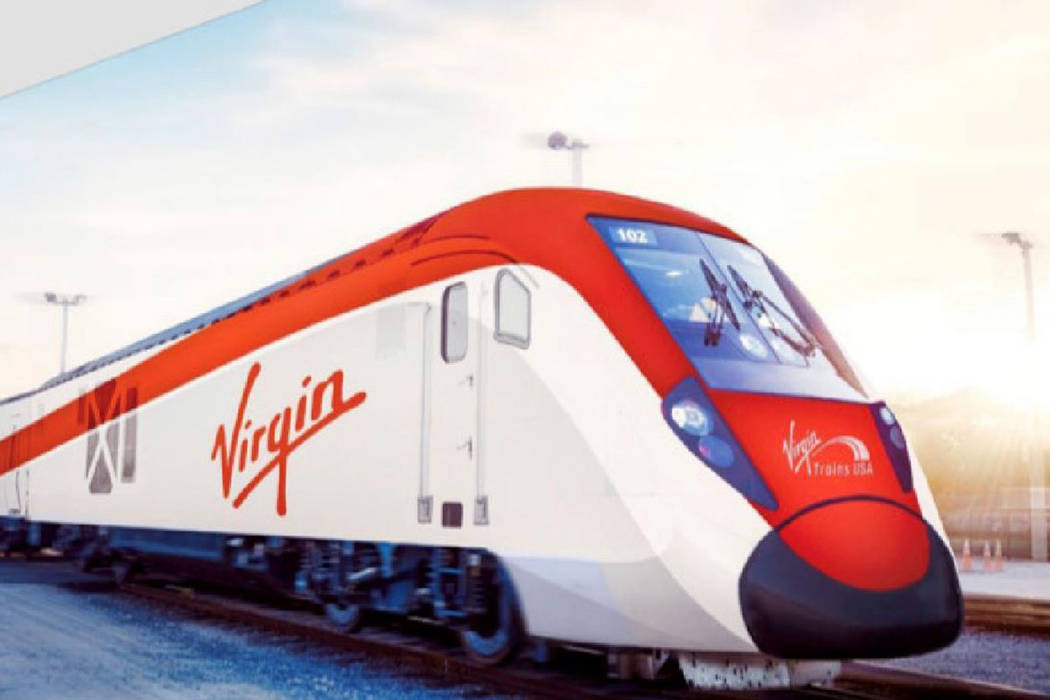California delays vote on 2nd round of Virgin Trains bond allocation
A California finance committee on Wednesday put off a decision on issuing $300 million in tax-exempt bonds to the Virgin Trains USA high speed rail project until next month.
The California Debt Limit Allocation Committee decided to wait until its Feb. 12 meeting to vote on a second round of bonds for the $4.8 billion Las Vegas to Southern California high-speed rail project, citing the pending review of the project’s final environmental impact statement by the Federal Railroad Administration.
“We will come back more educated and hopefully more confident that this project is going to meet all of the Federal Railroad Administration requirements,” said state Treasurer Fiona Ma.
The FRA approved plans for the project in 2011 when it was proposed by XpressWest, but Virgin Trains has since proposed design modifications to the project, requiring the federal agency to take another look.
The railroad administration expects to have its “record of decision” on the project sometime this year, according to FRA spokeswoman Desiree French.
An underwriter for Morgan Stanley told committee members Wednesday that she believes investors would put money into the project even without a final decision from the FRA. But she said they likely would require money from the sale of the bonds to be held in escrow until the record of the decision is made.
In all, Virgin Trains is seeking $600 million in bonding authority from California through its debt limit allocation. Internal Revenue Service guidelines would then allow Virgin to market up to four times that amount, or $2.4 billion, in tax-exempt, private activity bonds. The company also is seeking $850 million from the U.S. Department of Transportation’s bond program.
Deciding to hold off on the bond decision won’t affect the project’s timeline, as Virgin is still waiting for Nevada to approve tax-exempt private activity bonds as well.
Virgin is seeking $200 million in bonds from Nevada’s debt limit allocation — which would allow the company to market $800 million in bonds. It’s also seeking $150 million through the Department of Transportation’s bond program.
Nevada’s decision is expected to come in February or March, according to Virgin Trains spokesman Ben Porritt.
In addition to the bond issue, the committee was presented with the estimated economic impact the project will have for California.
The economic consulting firm Varshney &Associates said the project would generate an estimated $2.66 billion in economic activity for California through 2029.
The project is expected to create 20,000 construction jobs, 600 permanent jobs and generate $360 million in federal, state and local taxes, according to a report given to the California committee.
The station location in Victorville is slated to be just north of town off of Interstate 15 and Dale Evans Parkway, where Varshney &Associates projects mixed-use housing and retail development would sprout up.
An estimated 1,800 off-site multifamily units and 1,690 units on Virgin Trains land are expected to be supported by the addition of the train station in the Victor Valley.
The 170-mile track, including 35 miles in Nevada, would link the Victor Valley station to the Las Vegas station, which is slated to be constructed on Las Vegas Boulevard between Blue Diamond and Warm Springs roads.
A timeline included in the report states the rail line would be operational toward the end of 2023, with surrounding development of the station complete in 2025.
Phase two of the project, stretching the rail line to Palmdale, California, would begin in 2029, which would open up the possibility of extending to Los Angeles sometime thereafter.
Contact Mick Akers at makers@reviewjournal.com or 702-387-2920. Follow @mickakers on Twitter.


















